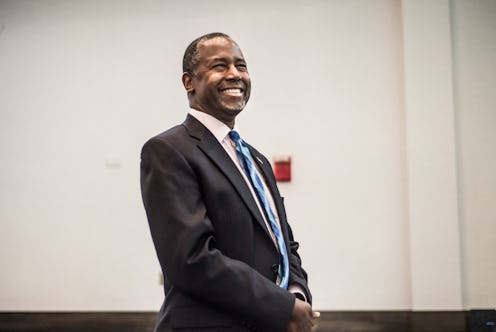News
There's A Movie With Cuba Gooding Jr As Ben Carson
Retired neurosurgeon and 2016 Republican presidential candidate Ben Carson was almost tied with Donald Trump in late-September opinion polls, just before he expressed the controversial opinion that a Muslim should not be president. Carson has recently gained popularity because he is considered an anti-establishment candidate, much like Donald Trump and Vermont Sen. Bernie Sanders. He also expresses a human quality that many of the other GOP candidates seem to lack. This human quality is over-dramatized in Gifted Hands: The Ben Carson Story. That's right, there's a 2009 made-for-TV movie about Carson's life. And it stars Cuba Gooding, Jr.!
The film reinforces Carson's image as a more practical than political person — a man who came from a poor family, made it to medical school, and then became famous for surgical feats that included separating twins conjoined at the head, removing half the brain of a four-year-old who suffered from convulsions, and operating on a dying man when he was still completing his medical residency.
The IMDb synopsis of the movie reads "Young Ben Carson didn't have much of a chance. Growing up in a broken home amongst poverty and prejudice, his grades suffered and his temper flared." In one scene, a young Carson, played by Gus Hoffman, is made fun of by classmates when he gets a question wrong in class.
Later, when he brings his report card home, his mom gets on his case. "So what happened?" she asks. "You weren't meant to be a failure, Benny. And you can control your temper and you can bring your grades up, too. I know you can." Benny protests, saying "I'm dumb, mother!"
But Carson's mother knows that this isn't the case, so she sends him to the library and tells him to read two books a week. Then, she requires the he turn in book reports to her, even though she only had a third-grade education. Young Benny really doesn't like this. He screams, "How can we possibly survive without television?!"
But eventually, Benny comes around. He starts studying, he learns his times tables, and in one particularly dramatic scene, he stands in front of the classroom and spells "lacquer." He becomes the highest-achieving student in his grade. But a rude teacher says really terrible things about him just before he accepts his award in front of his mother and the class. She says he's a "boy of color, he has no father in his life, he comes to us from tremendous disadvantages," and this means that the rest of the class should have done better than him. It's a pretty horrifying scene.
But Carson beats the disadvantages that the racist teacher said were standing in his way. He gets into Yale, where he apparently skips the lectures and learns all of the material on his own. (We've all tried that.)
He does well in school, though he encounters more racism during his residency. Then, in one truly shocking scene, Carson operates on a man even though he isn't a certified surgeon, and the man lives.
All dramatization and spelling bees aside, the story is remarkable. Carson obviously overcame serious racism and adversity to establish himself in medicine. Which is why it's so hard to understand just why he would make blanket statements about people from specific religions or backgrounds. The movie humanizes Carson, but it also makes it difficult to understand why his views don't recognize people who receive abortions, Muslims, or Black Lives Matter protesters for just what they are — human.
Images: Jhu Sts/YouTube (5)
